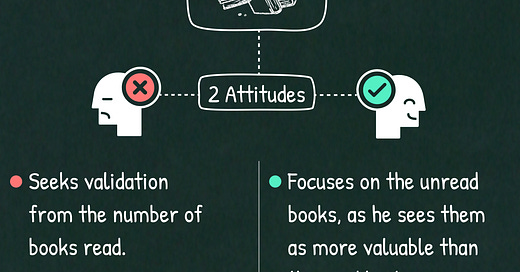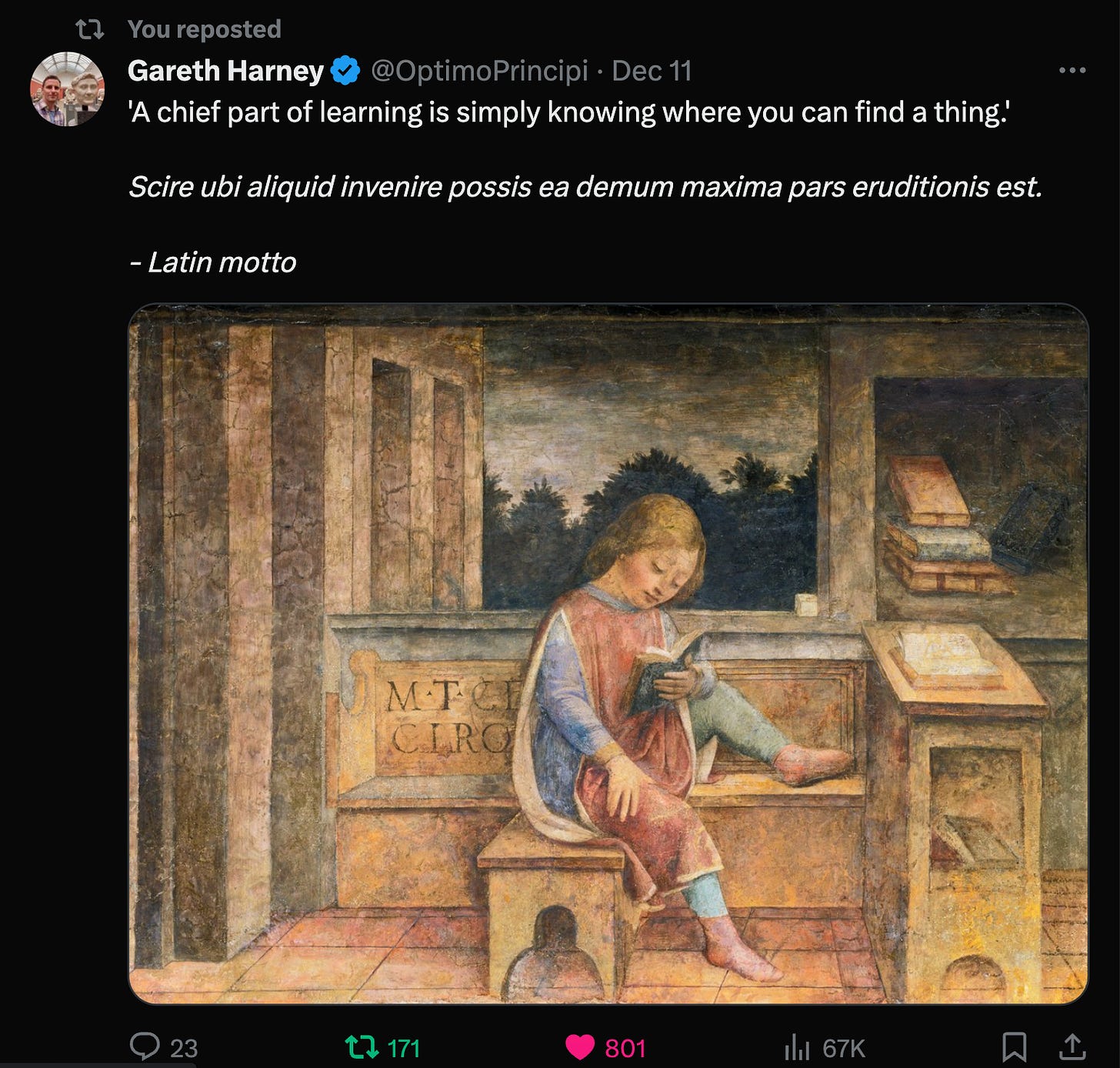Hello Friend!
Today I bring you an insightful passage from the book Antifragile, written by Nassim Nicholas Taleb.
👤 Author
💡Nugget
✦ Nassim Nicholas Taleb:
(From his book “The Black Swan”)
The writer Umberto Eco belongs to that small class of scholars who are encyclopedic, insightful, and nondull. He is the owner of a large personal library (containing thirty thousand books), and separates visitors into two categories:
Those who react with “Wow! Signore professore dottore Eco, what a library you have! How many of these books have you read?”
And the others—a very small minority—who get the point that a private library is not an ego-boosting appendage but a research tool.
Read books are far less valuable than unread ones. The library should contain as much of what you do not know as your financial means, mortgage rates, and the currently tight real-estate market allow you to put there. You will accumulate more knowledge and more books as you grow older, and the growing number of unread books on the shelves will look at you menacingly. Indeed, the more you know, the larger the rows of unread books. Let us call this collection of unread books an antilibrary.
We tend to treat our knowledge as personal property to be protected and defended. It is an ornament that allows us to rise in the pecking order. So this tendency to offend Eco’s library sensibility by focusing on the known is a human bias that extends to our mental operations.
People don’t walk around with anti-résumés telling you what they have not studied or experienced (it’s the job of their competitors to do that), but it would be nice if they did. Just as we need to stand library logic on its head, we will work on standing knowledge itself on its head. Note that the Black Swan comes from our misunderstanding of the likelihood of surprises, those unread books, because we take what we know a little too seriously.
Some quotes that came to mind:
“What is not intelligible to me is not necessarily unintelligent.”
- Nietzsche
“Any year that passes in which you don't destroy one of your best-loved ideas is a wasted year.”
- Charlie Munger
"Don't take yourself so seriously. You're just a monkey with a plan."
- Naval RavikantLet us call an antischolar—someone who focuses on the unread books, and makes an attempt not to treat his knowledge as a treasure, or even a possession, or even a self-esteem enhancement device—a skeptical empiricist.
This Blogpost is brought to you by Shortform - The platform that I love using to get nuggets from Books!
Shortform is THE platform to go if you wanna find highly valuable nuggets (big ideas) from important non-fiction books. This is how I mainly learn from books. Beyond offering book summaries, they provide you with a full guide and synthesis of all the worthy ideas in a book.
Personally, I love it because I can absorb book ideas at a faster pace compared to reading the entire books, and there is a deep analysis on each idea! (it is not shallowly explained, as it is the case in other platforms). But of course, for books that I’m deeply interested in reading I still read the entire book! And then use Shortform to quickly re-visit the main ideas.
I also made a short video exploring the platform and showing you how I’m personally using it. Here’s the Link!
The cost is equivalent to the price of one book a month and you can use my affiliate link to get a 5-Day FREE trial and a 20% Discount on the annual subscription (besides, you will be supporting my work 😉) - shortform.com/pickingnuggets
The mark of a great (non-fiction) author:
“It is my ambition to say in ten sentences what others say in a whole book.”
- Friedrich Nietzsche
💥 Stuff I Loved
If you enjoyed this newsletter edition, consider fueling 🔥 my work with an absurdly massive (or small) donation ✨
Today Mila, my sister’s dog, came for a sleepover! She was with me all the time writing this letter (as of Thursday 14th).
Wishing you a great weekend!













“Any year that passes in which you don't destroy one of your best-loved ideas is a wasted year.”
Love this! Growth is more about the beliefs we left behind than the knowledge we accumulate.
This was your shortest and perhaps the best newsletter I came across , I was aware of confirmation bias but it went further than that in the first 2 paras. Something which I'd like to add is People who are keen to learn new ideas not necessarily hold the different ideas but a simpler and a more deeper version of it.
Its like they know how to cut through bs, while reforming their ideas, like Naval Ravikant's tweets from today and 5 years ago are same, the difference lies today's tweet are a compressed version of his several ideas in just one, which affects all aspects of his other ideas. (I hope you can understand) its like his "money advice" in 2017 got reformed to "purpose/happiness advice" in 2023. He combined/understood the worth of money collectively in our society with happiness. Not seperating them. Its like same as a student asking me how to learn periodic table and I tell him to understand the properties of elements in chemical reactions.
(In this way, he'll learn periodic table, solving chemical equations and understanding the elements itself)
A compressed and a more usable version of this same advice which will work in every domain would be
"Find that one thing from your collective tasks which will make everything else easier or unnecessary"
And a more compressed version would be
"Learning fundamentals is important than learning the stuff itself"
And then
"All solutions are same cause all problems are same"
And then
"Problems arise from inefficient solutions"
And then
"Efficiency is a direct cause of entropy"
Like its the same idea of teaching chemistry to that student but densely package and extracted to be used in various places.